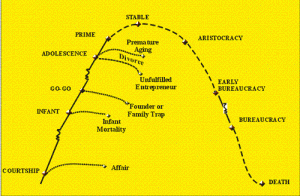
Regardless of your station in a for-profit or non-profit enterprise, it is critically important to have a clear understanding of your entity’s stage of life. Like us, companies have a distinct lifecycle, impacted by the leadership of the organization. Similar to the bell shaped curve below, companies start with an idea and then grow through the different stages of development, much like we do. However, unlike humans, companies can stay in their Prime for a long, long time—possibly forever. Unfortunately, those are rare instances, as most companies fall prey to business practices, like Bureaucracy, which bring them to their death. Much like we enjoy being around youthful young adults who are energetic and full of aspirations, few leaders are able to guide the development of a company in that stage to have it turn into a Stable enterprise.
An excellent example of such a company is Wal*Mart. Despite its age (65 years old) and size ($408 billion in revenue and 2.1 million employees), it continues to grow year after year. The way management has guided this company through its early development stages without turning it into a bureaucratic dying enterprise is a brilliant study in corporate leadership.
One of the reasons why Wal*Mart has succeeded is because everyone in leadership positions has understood their role through the various lifecycles. Here are some points to consider:
Here is the good news. Unlike humans, if your organization has gone past its Prime, through proper leadership and careful nurturing it can reverse course.
An excellent example of such a company is Wal*Mart. Despite its age (65 years old) and size ($408 billion in revenue and 2.1 million employees), it continues to grow year after year. The way management has guided this company through its early development stages without turning it into a bureaucratic dying enterprise is a brilliant study in corporate leadership.
One of the reasons why Wal*Mart has succeeded is because everyone in leadership positions has understood their role through the various lifecycles. Here are some points to consider:
- Determine your company’s stage of development--there are some very good books on the subject, including one by my good friend, Dr. Ichak Adizes, entitled Corporate Lifecycles. Learn to pinpoint where your company is on the bell shaped curve.
- Adapt your management style—to meet the needs for the stage of development your company is in. For example, in the growing years, success stems from taking risks (embrace it), emphasis is on function not form (be patient), cash is poor (don’t panic).
- Breathe life into the lifecycle—which means having the confidence in yourself to step aside, if the company’s lifecycle does not match your skill sets. An example would be an entrepreneurial company which has matured to become a publicly traded company, and thus require the skill sets of a “professional leader” vs. a “founder”.
Here is the good news. Unlike humans, if your organization has gone past its Prime, through proper leadership and careful nurturing it can reverse course.

 RSS Feed
RSS Feed